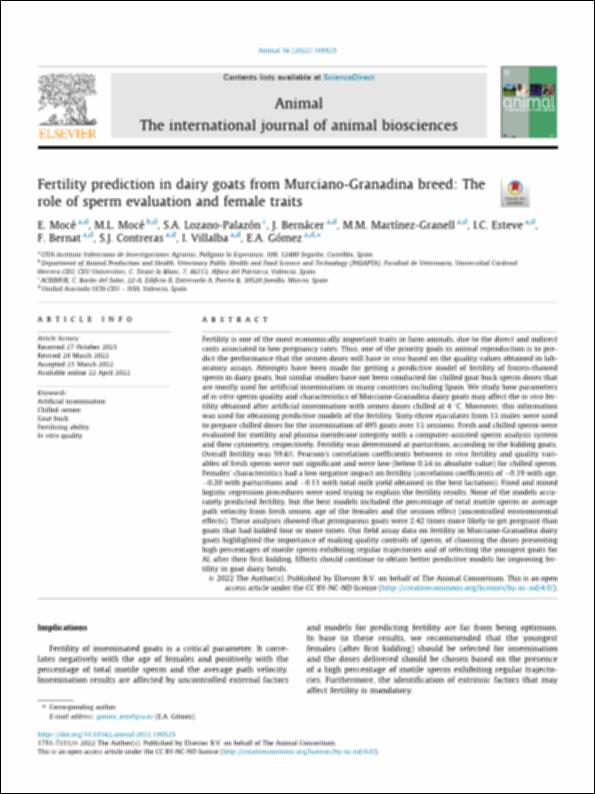Please use this identifier to cite or link to this item:
http://hdl.handle.net/10637/14297Fertility prediction in dairy goats from Murciano-Granadina breed the role of sperm evaluation and female traits
| Title: | Fertility prediction in dairy goats from Murciano-Granadina breed the role of sperm evaluation and female traits |
| Authors : | Mocé Cervera, Eva Mocé Cervera, María Lorena Lozano Palazón, Salvador Ángel Bernácer, J. Martínez Granell, María del Mar Esteve, Inés Carolina |
| Keywords: | Inseminación artificial en los animales.; Cabras - Inseminación artificial.; Goats - Artificial insemination.; Artificial insemination. |
| Publisher: | Elsevier |
| Citation: | Mocé, E., Mocé, M. L., Lozano-Palazón, S. A., Bernácer, J., Martínez-Granell, M. M., Esteve, I. C., Bernat, F., Contreras, S. J., Villalba, I., & Gómez, E. A. (2022). Fertility prediction in dairy goats from Murciano-Granadina breed: the role of sperm evaluation and female traits. Animal, vol. 16, i. 5 (may.), art. 100525. DOI: https://doi.org/10.1016/j.animal.2022.100525 |
| Abstract: | Fertility is one of the most economically important traits in farm animals, due to the direct and indirect costs associated to low pregnancy rates. Thus, one of the priority goals in animal reproduction is to predict the performance that the semen doses will have in vivo based on the quality values obtained in laboratory assays. Attempts have been made for getting a predictive model of fertility of frozen-thawed sperm in dairy goats, but similar studies have not been conducted for chilled goat buck sperm doses that are mostly used for artificial insemination in many countries including Spain. We study how parameters of in vitro sperm quality and characteristics of Murciano-Granadina dairy goats may affect the in vivo fertility obtained after artificial insemination with semen doses chilled at 4 C. Moreover, this information was used for obtaining predictive models of the fertility. Sixty-three ejaculates from 13 males were used to prepare chilled doses for the insemination of 495 goats over 13 sessions. Fresh and chilled sperm were evaluated for motility and plasma membrane integrity with a computer-assisted sperm analysis system and flow cytometry, respectively. Fertility was determined at parturition, according to the kidding goats. Overall fertility was 59.6%. Pearson’s correlation coefficients between in vivo fertility and quality variables of fresh sperm were not significant and were low (below 0.34 in absolute value) for chilled sperm. Females’ characteristics had a low negative impact on fertility (correlation coefficients of 0.19 with age, 0.20 with parturitions and 0.11 with total milk yield obtained in the best lactation). Fixed and mixed logistic regression procedures were used trying to explain the fertility results. None of the models accurately predicted fertility, but the best models included the percentage of total motile sperm or average path velocity from fresh semen, age of the females and the session effect (uncontrolled environmental effects). These analyses showed that primiparous goats were 2.42 times more likely to get pregnant than goats that had kidded four or more times. Our field assay data on fertility in Murciano-Granadina dairy goats highlighted the importance of making quality controls of sperm, of choosing the doses presenting high percentages of motile sperm exhibiting regular trajectories and of selecting the youngest goats for AI, after their first kidding. Efforts should continue to obtain better predictive models for improving fertility in goat dairy herds. |
| Description: | Este artículo se encuentra disponible en la siguiente URL: https://www.sciencedirect.com/science/article/pii/S1751731122000763?via%3Dihub En este artículo de investigación también participan: F. Bernat, S. J. Contreras, I. Villalba y E. A. Gómez. |
| URI: | http://hdl.handle.net/10637/14297 |
| Rights : | http://creativecommons.org/licenses/by-nc-nd/4.0/deed.es |
| ISSN: | 1751-7311. 1751-732X (Electrónico) |
| Language: | es |
| Issue Date: | 19-May-2022 |
| Center : | Universidad Cardenal Herrera-CEU |
| Appears in Collections: | Dpto. Producción y Sanidad Animal, Salud Pública Veterinaria y Ciencia y Tecnología de los Alimentos |
Items in DSpace are protected by copyright, with all rights reserved, unless otherwise indicated.


